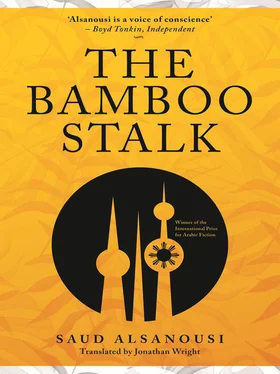There were about twenty of us. The faces varied but they were all Filipino. Their interests differed too but they were all Filipino. Although the flat was in Kuwait, it was Filipino. A bald man in his forties, as soon as the alcohol took effect, started talking about how much he missed his wife and children. A young man with his baseball cap facing backwards asked us to sing along with him for his girlfriend, who was listening to us on the telephone. A girlish young man in a tight short-sleeved shirt and shorts showed off his legs as he pranced around to our songs in a way that made people laugh. A man with a camera wouldn’t stop taking pictures. One man drank reluctantly, cursing the state of affairs that forced him to work in Kuwait and complaining with every sip that he missed the taste of Red Horse, Heineken, Budweiser and the other beers he was used to. Some of them stuffed themselves with food. Others spent the time watching silent images on the television screen. Others formed small circles, sharing food, drink and conversation.
I moved over to the window overlooking the street with a drink in my hand. I watched the young men in the car park outside the building. They were getting out of their cars and coming to the door of the building alone or in small groups. One of them was with a friend, another with a woman. They looked around warily, like thieves preparing for their first burglary. The others noticed I was standing apart and came over to join me. They looked out of the window like me. One of them made fun of the young Kuwaitis. The guy with the baseball cap laughed and kept making jokes about people in Kuwait. The man who had been complaining knocked back the rest of his drink in one swig and spoke angrily about Kuwaitis, saying derogatory things about them. I remembered my father and imagined his remains, draped with the Kuwaiti flag and carried on his friends’ shoulders. ‘They’re arrogant,’ said the bald man. The glass shook in my hand. ‘But the young men here are sexy,’ said the effeminate one, licking his lips. Some of them burst out laughing. The man with the camera defended the Kuwaitis: ‘I’ve been working with them for years. They’re decent people, open-minded compared with people in other countries I’ve worked in.’ The grumbler objected: ‘I worked in Bahrain and the people there don’t make us feel they’re better than us.’ The man in the cap laughed and winked at his friend. ‘And you can buy a drink there too,’ he said. The grumbler got upset and waved his hand dismissively. ‘They’re useless,’ he said.
Listening to them, I felt torn between Kuwait and the Philippines. I hardly knew myself. Ibrahim didn’t think of Kuwaitis in this way. He had never told me all this. ‘All they have is money,’ said the grumbler. The man with the camera pointed at him and said, ‘What makes you angry is that Kuwaitis are really lucky to be born Kuwaiti, and you resent their good fortune.’ ‘Bullshit,’ the grumbler replied angrily. The bald man, the oldest person present, intervened. ‘That’s enough. Happy New Year, Happy New Year,’ he said. The man with the camera ignored the interruption and continued his conversation with the grumbler, who poured more drink into his glass. ‘I have lots of friends here and they’re not the way you portray them,’ he said. The effeminate man agreed and made an obscene gesture. ‘I have lots of friends too,’ he added.
I downed the rest of my drink and asked for more. Their criticism of Kuwaitis rang in my ears. I thought of my father, Khawla, Hind and Grandmother. The group went on talking a long time. Others joined them and some moved away. I turned to the grumbler and said, ‘Go back to the Philippines if you don’t like it here.’ He looked at me disapprovingly and said, ‘Are you happy to stay here?’ Since I couldn’t work out how to answer, I had to leave the party. I thanked the host and left, rather the worse for wear, thinking about what the man with the camera had said about Kuwaitis being lucky to be born Kuwaiti.
Outside the flat, three young men were waiting for the lift. The landing rang with their laughter. Apparently they had just finished their own party. ‘ As-salam aleekum ,’ I said as I walked past them.
Making fun of my accent, the man in the middle answered me like Grandmother’s parrot: ‘ Salamuuu alekooom .’ With his index fingers, he stretched his eyes into slits, mocking my Filipino features. They burst out laughing. He then made fun of me by greeting me in Filipino: ‘ Kumusta ka .’ I don’t know why, but I felt insulted. They started talking to each other in Arabic and roaring with laughter.
I opened the door of my flat. I now felt an urge to insult these people, though I had been angry when the Filipinos at the party next door had maligned them. I glowered at the one who had made fun of my greeting. ‘ Sira ulo ,’ I said without thinking — Filipino for ‘crazy head’ or ‘idiot’. They looked at each other in puzzlement. Damn! Even my insult took me back to my mother’s country.
I remembered another word. I said it to myself first to make sure I had it straight. Then I pointed at the man in the middle and let it out. ‘ Himara !’ I said.
I slammed the door behind me, grateful to Grandmother’s parrot.
5
Kuwait, one year on.
I started playing with the idea of going back to the Philippines and visiting the family house. Although she missed me, my mother was against the idea and implored me to stay in Kuwait longer. I didn’t know whether she was asking me to stay for my own sake or for the sake of the family, which was better off because of the money I was sending them. I gave up the idea of making the journey, not in deference to my mother’s wishes, but because I was sure that if I went home before I had established roots in Kuwait, I would never come back.
Ibrahim promised to help me get a job. I had declined to join him and his friends in their missionary activities because I didn’t know enough about it and I wasn’t ready for things like that. I had only just begun to explore my relationship with God and how comfortable I was with that relationship.
Ibrahim was a nice guy but very simple. He proved to be a loyal friend. Whenever I asked him for anything he was quick to help me. He called me brother and when I asked him why, he said, ‘A Muslim is brother to all other Muslims.’ I was grateful for the way he felt towards me. I never told him I wasn’t yet sure that I was Muslim because I was still feeling my way, but if I did become a Muslim he would definitely have been one of the reasons for my decision. There were three things that I discovered through Ibrahim and that made me sympathetic to Islam and taught me more about it: the film The Message , a book called The Sealed Nectar, a biography of the Prophet, and the fact that Ibrahim treated me well and took an interest in me.
Although the cars are one of the most striking aspects of Kuwait and I could have bought a modest one, I made do with a bicycle, which I bought with Ibrahim’s help. I used to ride it around the neighbourhood and nearby areas. It was a smart black bike. I attached a Kuwaiti flag to the back of it. Although I had seen the flag everywhere — on my first day in Kuwait, when I saw it at half mast near the airport, in people’s hands at the National Day celebrations in February, and flying in various sizes from people’s cars — it didn’t mean anything to me until I saw it covering the remains of that Kuwaiti poet and Ghassan told me that my father’s remains had been covered with the Kuwaiti flag in the same way. After that the Kuwaiti flag had special meaning for me and stirred something inside me.
After I bought the bike I could say goodbye to taxis and their extortionate fares. I could cruise the streets at will and sometimes I couldn’t believe how far I had ridden on my bike. It was extremely hard work but any effort I made to ride my bike was better than sitting in a bus seat, scanning the streets through the window, and leaning forward and putting my head between my knees whenever I caught sight of boys standing on the pavement, braced for the fragments of glass that might land on the terrified passengers if a stone hit a window.
Читать дальше












